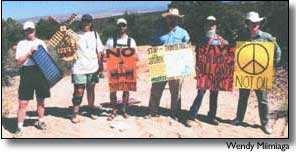|
Sept. 27 2001
By Jim Mimiaga A dozen protesters armed with miniature windmills and solar panels marched for alternative energy solutions at a fossil-fuel exploration site near Canyonlands National Park in Utah on Sunday. Members of the Durango-based environmental group Great Old Broads for Wilderness, along with the Moab Action Network, protested a Bureau of Land Management decision to allow the seismic study on a desert wilderness. But stopping the project was not the intent of the lively protest, said Rose Chilcoat, program director for Great Old Broads. In July, a federal judge denied a request by the Southern Utah Wilderness Alliance for a preliminary injunction to stop the seismic study. "It is not the companies we were protesting, but what we see as a bad decision by the BLM," Chilcoat said. "We had an opportunity to meet with the company and express our concerns, and while it got kind of heated, we did find some common ground." The 36-square-mile area is located around Dead Horse Point State Park, Gemini Bridges trail system and Bull Canyon along the northeastern boundary of Canyonlands National Park. Opponents expressed concerns about vehicles driving over the fragile desert environment as workers install 109 miles of geo-phone lines needed to map the subsurface. A fleet of five huge "thumper trucks" vibrates the ground with special pads and the returning sound date indicates whether pockets of fuel are available for extraction. The modern seismic operation, being conducted by Veritas Inc., eliminates the need for test holes. Denver-based Intrepid Oil and Gas LLC, is the contractor with the permit. Intrepid holds one of several BLM leases for oil and gas extraction in the region awarded in the 1980s. The conflict arose when the BLM listed the region as having wilderness qualities, but then allowed for development. In January, the BLM listed the region in the Federal Register as restricted to off-highway use in order to prevent new roads from appearing. The trucks are obligated to use designated roads, although the permit does allow for some cross-country travel where there are no roads, according to the BLM. Critics contend that the roads are not wide enough to handle the massive equipment, leading to destruction of native vegetation and the black cryptobiotic soil that prevents desertification. They further argue that the BLM approval contradicts its own policy restricting off-road travel because of the area’s pristine wilderness qualities. The region is critical habitat for bighorn sheep, a species of concern, and the Mexican spotted owl, which is on the federal threatened-species list. Environmental concerns were addressed in the permit, countered Maggie Wyatt, BLM’s Moab field manager. Work must be completed by Oct. 15 to allow for the sheep’s rutting season. Archaeological sites have been flagged to be avoided, specific travel routes were mapped out, and reclamation requirements will minimize vehicle tracks, she said. Reseeding is also part of the plan. "We have seen similar type of work, and our analysis is that the impacts are short-term — from three to five years," said Wyatt. "We put a lot of stipulations on the permit. You can tell they (the trucks) have been there, but (the impact) is not as violent as some environmental groups are trying to portray." Wyatt said that the area is restricted to travel on designated roads. However, language does reserve off-road activity for "administrative purposes" on a limited basis by lease-holders. The BLM is somewhat obligated to provide for exploration on public lands leased specifically for oil and gas production, Wyatt said. "Energy exploration is a legitimate use, so If there is a lease, then we figure out a way for them to exercise that right in the most environmentally sound way possible," Wyatt said. "Otherwise it would be like having a grazing permit that did not allow for cows." But the protesters stressed the importance of conservation ethics and breaking America’s dependence on non-renewable fossil fuels. "We believe it is time for each of us to reduce our personal consumption, because with oil and gas, we are tapping into a dry well," Chilcoat said. "It is time to make the switch and get politicians to put money into alternative fuels." |
||
|
Copyright © 2001 the Cortez
Journal. All rights reserved. |
